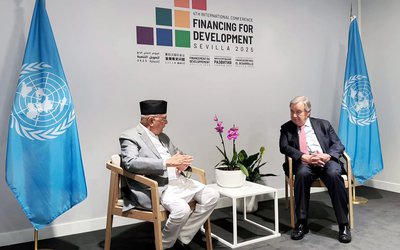Volunteerism has two dimensions. One is traditional and the other is professional. Traditional volunteerism is very much attached with the families and communities. For instance, it has been there in the society for long, manifested during the social rituals like marriage ceremony, funerals as well as other community level activities. Volunteers have supported the people in case they are unable to do things personally. For example, groups known as Guthis construct small sheds, water taps and temples. They are basically helping the people. One of the objectives of the traditional type of voluntarism is to help individuals in need without expecting any economic benefits out of this. There is no place for loss and profit in this pure service. In other words, rendering service on humanitarian values, rather than for any other benefits, is the goal of such volunteerism.
In the recent times, organized volunteerism or professional volunteering is coming up strongly. This kind of volunteering is different from the traditional, service-oriented one done for welfare purposes without any financial interest involved in it. However, the new concept of volunteerism is a little different from the old one as it involve sharing of knowledge and idea of people with a minimum cost.
The modern volunteerism also believes in the survival of individuals. Thus, the paid volunteering concept is growing. For instance, UN, Japanese Overseas Volunteers, Korean Volunteers, VSO, and Peace Corps mobilize volunteers to share their knowledge and expertise. Even Nepal government mobilizes volunteers. Under the Ministry of Health and Population, more than 30,000 Female Community Health Volunteers (FCHV) have been serving the people in remote parts of Nepal. Under National Planning Commission Secretariat, National Development Volunteer Service has been mobilizing volunteers in 72 districts of Nepal.
Nepal government provides livelihood allowances to volunteers for sharing knowledge and expertise in remote and rural parts of the country. As the traditional types of altruistic activity continue with motive for goodness and feeling of self respect or service for self worth and respect, the modern kind of volunteerism, with nominal financial support, is also going on in Nepal. Along with encouraging with people to take noble volunteerism, program launched by NDVS is also providing employment opportunity. Popularity of NDVS is so high that over 23,000 individuals applied for just over 476 vacant positions for the period of two years. The volunteers are providing the services to the needy people sharing their skills and knowledge in remote parts of Nepal on just livelihood allowances.
Every country has its own volunteer programs. I visited one of the volunteer programs in the Philippines a few years back where the volunteers are mobilized in the name of Eagle Protection. They provide nominal allowances for the volunteers. In Thailand, under social protection scheme, volunteers are mobilized to protect elderly people and people living with HIV/AIDS.
New Policy
As voluntarism is popular among the people and many Nepalese as well as foreigners want to serve remote and rural parts of Nepal, new policies are imperative. NDVS has been working for the last two years to draft a new policy and make it relevant in the current national and international contexts. NDVS has already completed half of the work. There are a number of national and international volunteer organizations working in Nepal. In the absence of proper policy, the government does not know whether all these volunteers are working in the priority sector of Nepal or somewhere else. Similarly, there is no monitoring mechanism and institution to look after the volunteers. The country needs a National Volunteer Policy to cover all these. The government does not know where the national and international volunteers are placed and how scattered they are, or how they are contributing to meet the national targets. What role are they playing in the areas of poverty reduction? The policy also needs to end the duplication of various volunteer organizations.
Nepal has a lot of sectoral policies. However, there is no policy on volunteerism. The on-going 13th plan has a separate chapter on volunteerism which gives certain guidelines on how to use the volunteers. The periodic plan has shown the long term and short term priority for national volunteers and their use. However, there is no policy as such to say why the country needs volunteers and how to utilize them in achieving development targets. As there is no policy, one cannot say what is volunteerism or what is professional work. How should volunteers be treated and what should be given to them and how to recognize them? National Volunteer Policy needs to be formulated in order to give due recognition to the organizations and volunteers serving in Nepal. This will also force organizations to take the ownership of their work. Although civil society organizations and international organizations have been mobilizing the volunteers in larger numbers than the government, there are no mechanisms and guidelines. As per the priority and target of the government, NDVS has been selecting the volunteers in five sectors. The sectors include Health, Engineering, Agriculture and Veterinary.
The policy also needs to give clear directions and lay down the vision for how long volunteerism should be used. NDVS is now mobilizing the volunteers in agriculture, livestock, engineering and medicine. Along with these sectors, there are also other domains waiting to be identified and covered. There is also the need to develop a volunteer mobilization framework or expand framework through policy amendment. There is also the need to expand the traditional types of volunteerism. In many parts of the country, individuals have been supporting others through personal contributions. There is the need to recognize these individual donations and contributions in the areas of health, education, rescue, relief in disaster and other such areas. There is also the need to consolidate such activities in the national frame work, giving volunteers their identity.
As usual, NDVS celebrated International Volunteers Day on December 5. In the past, we always played the coordinating role. Due to the pressure of finalizing the list of new volunteers, we were unable to afford to do the same this year. We spent almost 4 months to select and depute the volunteers. This year UN Volunteers played a coordinating role and we also participated in the day. NDVS organized a program in eastern Nepal and hosted interaction in Siraha on proposed policy. NDVS hosted programs in Banke and organized a talk program in a Nursing College about the importance of volunteerism. There is the need of more consolidation and coordination.
NDVS has already appointed 442 volunteers in 72 districts. Our total positions allocated for regular sectors is 664, with 58 institutional. We have almost completed the appointment of the volunteers. Some 650 are working now in various district levels. We have also sent a few people to the schools. We annually publish the profiles of volunteers. VSO Nepal, Run man, UNV, Peace Corps -- we have profiles of 50 agencies. There are many other NGOs also working in the area. Social Welfare Council is keeping their profiles too.
Way forward
There is the need for alignment of volunteer organizations with the policies and targets of the government. There is need of harmonization among them. All the volunteers need to support the national targets. The volunteers need to attach their work with the periodic plan and national development goals. The state needs to formulate the policy to ensure this.
Volunteerism is related to individual interests. People have to take initiatives for volunteerism. The government needs to pay certain level of cost for sharing the knowledge. This will sustain the spirit. The traditional mode of volunteerism is gradually disappearing. But then there is the need to protect the traditional voluntarism as well. Both types of volunteerism should go side by side. Our experiences have shown that we can make a lot of difference in society. Our volunteers are providing big services saving the life of women and children in health centers. Similarly, they are contributing infrastructure and promoting agriculture. Our volunteers are saving life in birthing centers. Our research has shown that the work done by volunteers is more productive than the work done by the government employees with higher salaries. Certainly, the volunteers have shown that they are more effective in the areas of poverty alleviation and social change. Our volunteers are from the ultra poor, who draw Rs. 140,000 annually, which also supports poverty alleviation.
If the government wants to make NDVS as a mechanism to achieve the development goal, it should be given broader roles and responsibilities. Volunteering is generally considered to be an altruistic activity and is intended to promote goodness or improve human quality of life. In return, this activity can produce a feeling of self-worth and respect. There is no financial gain involved for the individual. Volunteering is also renowned for skill development, socialization, and fun. Volunteering may have positive benefits for the volunteer as well as for the person or community served. It is also intended to make contacts for possible employment. It is helping, assisting, or serving another person or persons without pay. Many volunteers are specifically trained in the areas they work, such as medicine, education, or emergency rescue. Others serve on an as-needed basis, such as in response to a natural disaster.
















